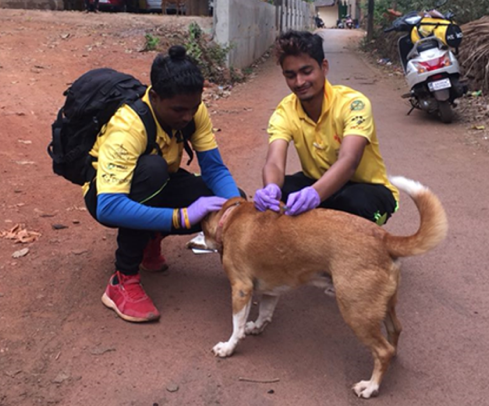Oral dog vaccine could help beat rabies
Millions of street dogs could be vaccinated by using an oral dog vaccine for rabies hidden in food, research suggests.

Vaccines hidden in dog food could help curb the spread of rabies in countries with large populations of stray dogs, research suggests. Experts say the approach could help to vaccinate millions of street dogs around the world that are often responsible for spreading the disease to people.
More efficient vaccination
Three times as many dogs could be vaccinated each day when the new process is combined with existing injectable techniques.
Experts from Mission Rabies, the Worldwide Veterinary Service and The Royal (Dick) School of Veterinary Studies assessed the feasibility of the approach in Goa, India. The oral rabies vaccine is not yet licensed for use in India so the team embedded empty capsules in dog food to test the concept.
Working with the Government of Goa Animal Husbandry Department, teams on mopeds searched for free-roaming dogs, delivering capsules in an attractive bait. Each member of the team reached 35 dogs each day, compared with just nine using current vaccination methods.
They accessed 80 per cent of the dogs they spotted, compared with 63 per cent when only using the catch-vaccinate-release method. As well as being more efficient, the researchers estimate that the combined vaccination approach could be cheaper, helping to further maximise limited resources.
Minimising risk of transmission to people
There are an estimated 100 million stray dogs in India. Experts say that the combination of an injectable and oral vaccination approach could help them reach the minimum 70 per cent vaccine threshold needed to minimise risk of the disease being passed to people.
Deaths from rabies
Rabies is a serious brain infection that is usually caught from the bite or scratch of an infected animal, often a dog. The disease has been eliminated from many countries but remains challenging in countries where dogs are allowed to roam freely.
Around 59,000 people die each year from the infection with a further 29 million people needing costly treatments after being bitten by dogs in areas where the disease is rife.
Benefits for dogs and people
Researchers hope the study will provide evidence to support the introduction of the oral rabies vaccine in India as an extra tool in efforts to eradicate the disease.
“Rabies has a massive impact on societies, not only from the disease, but also from the fear that results. In many parts of the world, reaction to rabies cases fuels inhumane mass culls of dogs, which does nothing to combat the virus. We are showing that there is another way that benefits dogs, people and nations.” Dr Luke Gamble, Founder of Mission Rabies
“This kind of operational research is crucial in pushing the boundaries and finding a solution to the age-old problem of rabies. Dog populations vary, so it is essential that methods are evaluated methodically. We are excited that this approach could have far-reaching benefits.” Professor Mark Bronsvoort, The Roslin Institute
The study, published in Vaccine X, also received funding from Dogs Trust Worldwide and donations of vaccines from MSD Animal Health.
Contact
Jen Middleton, Press & PR Office
0131 650 6514, 07795 640662


